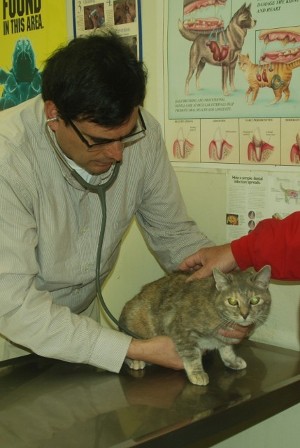(main)
Animal Vaccines

Your 4-legged family member is in good hands at Companion Animal Hospital of Washingtonville/Blooming Grove. We take the time to explain various vaccines to you, as well as the importance of annual care. Contact us today for more information on the importance of animal vaccines.
All About Animal Vaccines
How do vaccines protect my pet?
The immune system plays a vital role in maintaining your animal's
health. Vaccines help prepare your animal's immune system to fend
off invasion by a particular disease-causing organism. Vaccines
contain antigens, which to the immune system "look" like the
organism but don't, ideally, cause disease. When a vaccine is
administered, the immune system mounts a protective response.
If your animal is subsequently exposed to the disease-causing
organism, its immune system is prepared either to prevent infection
or reduce the severity of disease. Vaccines do not induce complete
100% protection from the disease, nor do they induce the same degree
of protection in all animals.
Is annual vaccination necessary?
Vaccines last for different periods of time; some are designed to
provide protection for 1 year, some for 2 or 3 years. It is
important to know what type of animal vaccine was previously used.
If owners are particularly worried about reactions, they may opt to
have blood drawn to determine the levels of protection their pet has
against various diseases. If they have adequate levels of
protection, it is not necessary to vaccinate that particular year.
These tests should be done on an annual basis.
Are animal vaccines dangerous? What reaction may I
expect to see?
Unfortunately, a perfect, risk-free vaccine does not exist. As with
any medical procedure, there is a small chance that reactions may
develop as a result of animal vaccinations. Reactions may be mild or
serious (including fatal). The following reactions are fairly common
and usually within hours after vaccinations, lasting no longer than
a few days:
Discomfort at the site where the vaccine was given, mild fever, loss
of appetite and activity, sneezing, temporary sore joints and
lameness, development of a small, firm, and painless swelling under
the skin at the administration site. Anaphylactic reactions may
occur; as a result your pet may develop hives, swollen jowls,
vomiting, diarrhea, or have difficulty breathing. These symptoms
require immediate treatment. Another serious reaction would be a
tumor called a sarcoma developing at the vaccine site several weeks,
months, or longer after vaccination. This reaction occurs very
rarely.
What should I do if I think my animal is having a
reaction to a vaccine?
By all means, consult Companion Animal Hospital. Your veterinarian
is the person most qualified to advise you if side effects do occur
to animal vaccines. At home, you may give Benadryl at a dose of 1
mg/pound every 12 hours for 1 to 2 days as needed. More severe cases
may require administration of cortisone, epinephrine, or
hospitalization. This can only be determined after examination. If
we are unavailable to accommodate you, please call the nearest
emergency facility.
Make sure your pet receives the annual care necessary for a long and healthy life by visiting our Washingtonville, New York animal hospital today for complete animal vaccines.
Companion Animal
Hospital
15 South Street Washingtonville, NY 10992
Phone:
845-496-9058
845-496-0829
Fax: 845-496-1123
Business Hours
Monday-Saturday
9:00AM-1:00PM
Evening Appointments
Tuesdays & Thursday
4:00PM-8:00PM
Why choose Us?
> Personalized care
> Orange and Rockland county house Calls
> Care provided By Dedicated Animal Lovers
> Every Pet is Special To Us, Young Or Old
American Veterinary Medical Association
American Society for the Prevention of cruelty to Animals
![]()
![]()
![]()
![]()
Copyright Companion Animal Hospital of
Washingtonville/Blooming Grove | All Rights Reserved | 15 South Street
Washingtonville, NY 10992 | 845-236-5593
Site designed and hosted by
Engineered Solutions

